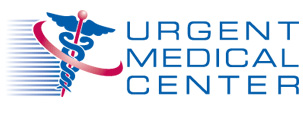
Pneumonia is inflammation and a build up of fluids in the alveoli, which are microscopic air sacs in the lung. One or both lungs may be impacted. Virus or bacteria generally provoke pneumonia, but in rare cases other microorganisms, drugs or autoimmune diseases may be the related cause. This is why people are often diagnosed with pneumonia while recovering from a different illness.
Common Symptoms Of Pneumonia
The most common pneumonia symptoms include:
- Persistent cough
- Pain or discomfort in chest, especially when coughing or taking a deep breath
- Fever and chills
- Difficulty breathing
- Nausea and vomiting and/or diarrhea
- Achy muscles
- Headache
- Tired, fatigued
- Abnormal sweating
4 Signs You Need Medical Attention For Possible Pneumonia
Many symptoms of pneumonia are common symptoms of other, less serious illnesses. This makes it difficult to decide when you should see a doctor and when at home care is substantial. Here are 4 signs you should visit Urgent Medical Center.
1. You Have A Very Persistent Cough
Coughing for a few days, or even an entire week, may signal nothing serious at all. But, if your cough persists beyond what seems normal and is not showing signs of improvement you should visit a doctor ASAP. Your risk for pneumonia increases if you notice rusty-colored sputum or blood coming up when you cough.
Any cough that does not die down or improve within a few days to a week is cause for concern, even if it’s not related to pneumonia.
2. You Have A Consistently High Fever
If your cold-like symptoms are accompanied by a fever that reaches 102 degrees F or higher you should visit Urgent Medical Center. This is especially important if your fever persists for more than 24-hours.
3. You Have A Weakened Immune System
If you have a weakened immune system for any reason you should visit urgent care at the first signs of a bad cough or cold. Pneumonia becomes increasingly worse at a rather rapid rate if your immune system is not up to par. Your immune system may be decreased if you take an immune suppressant or have any underlying conditions that impact your health, this includes if you are pregnant.
4. You’re 60-Years +
Age has an impact on the severity of pneumonia. Many elderly patients become ill with pneumonia and never recover. If you are over 60-years-old your risk for potentially fatal pneumonia increases, which is why it’s so important to receive treatment as soon as possible.
Is Pneumonia Deadly?
Around 450 million people, or 7% of the population, become sick with pneumonia every year, and about 4 million of these cases are fatal. Pneumonia used to cause more deaths, but thanks to the invention of antibiotic therapy and vaccines we have seen a great reduction in fatalities.
High death rates related to pneumonia still persist in developing countries as well as among the elderly, very young, and chronically ill patients. Elderly patients suffering from lingering illnesses are often infected with pneumonia, in which case the risks increase.
Thankfully, there are treatment options available. The best thing you can do is get medical attention the moment you experience signs of pneumonia.
Treatment Options For Pneumonia
There is a wide range of treatment options available for patients with pneumonia. Since pneumonia may be caused by a bacteria or virus, there are several different options depending on what sparked your particular case. Only a doctor will know what type of pneumonia you have as well as the appropriate treatment.
In most cases your doctor will prescribe an antibiotic. Different antibiotics used to treat pneumonia include:
- Levofloxacin
- Doxycycline
- Cephalexin
- Vancomycin
- Amoxicillin
- Azithromycin
- Erythromycin
- Cefadroxil
Your age, symptoms, and type of pneumonia will influence the right antibiotic for you. You must take the antibiotic until it is finished, even if your symptoms completely disappear. Otherwise, it may come back stronger and be resistant to the same antibiotic.
It is not unheard of for the same virus that causes chickenpox to cause pneumonia. If this is the case, there are antiviral medications available.
On top of taking medication you also want to:
- Get plenty of rest as your body works to fight off the infection.
- Drink plenty of fluids so that your body does not become dehydrated.
- Don’t take cough medicine unless absolutely necessary, as your cough is your body’s way of getting rid of the infection.
- Take over-the-counter medications such as Aspirin or acetaminophen to reduce fevers and aches.
Visit Urgent Medical Center today and get on the road to recovery. To decrease wait times, schedule an immediate appointment online here: Web Check In.
Reference




